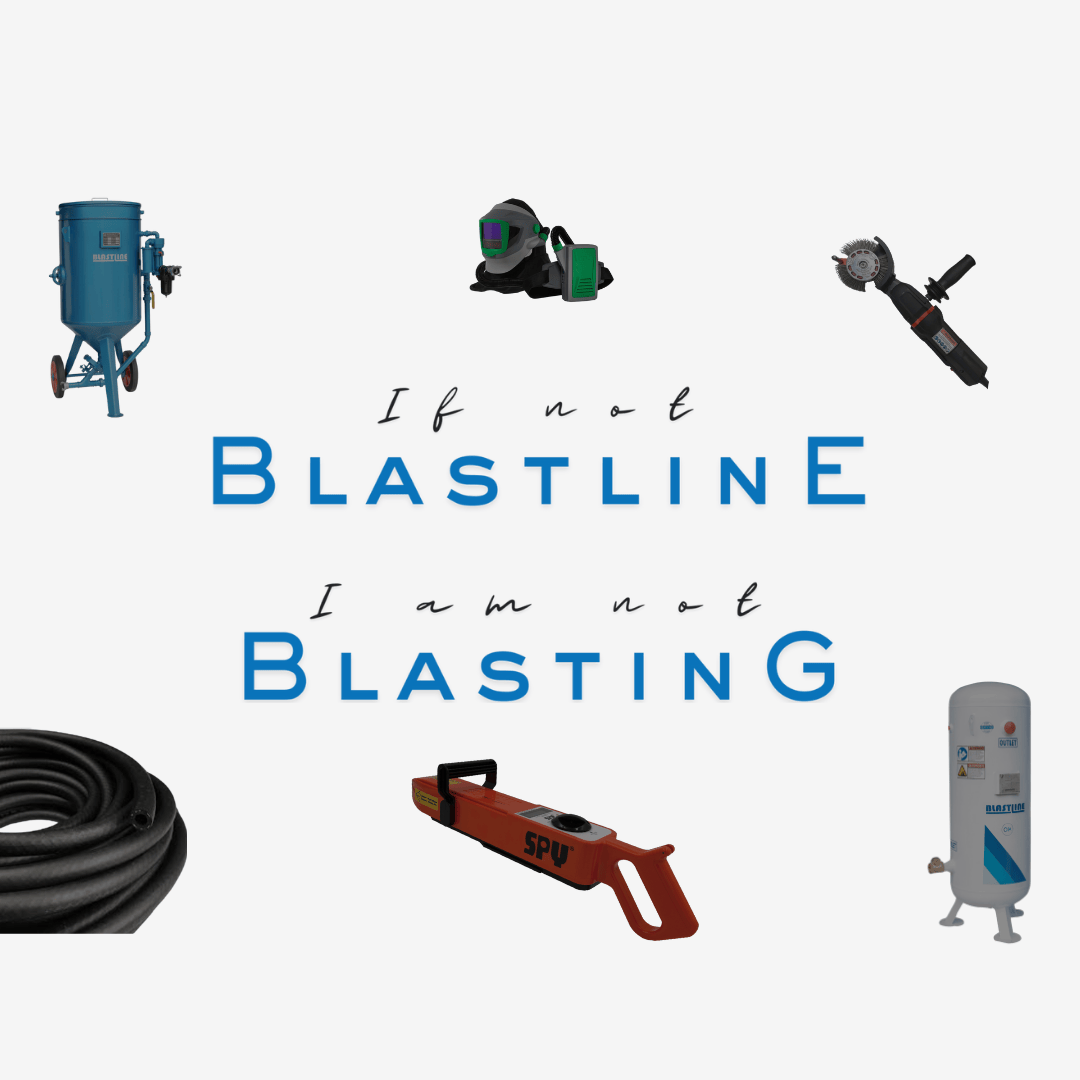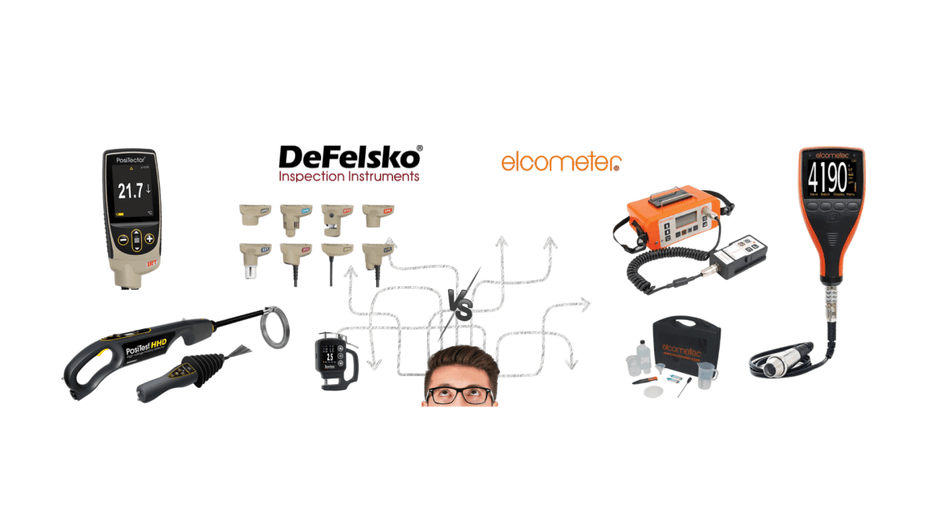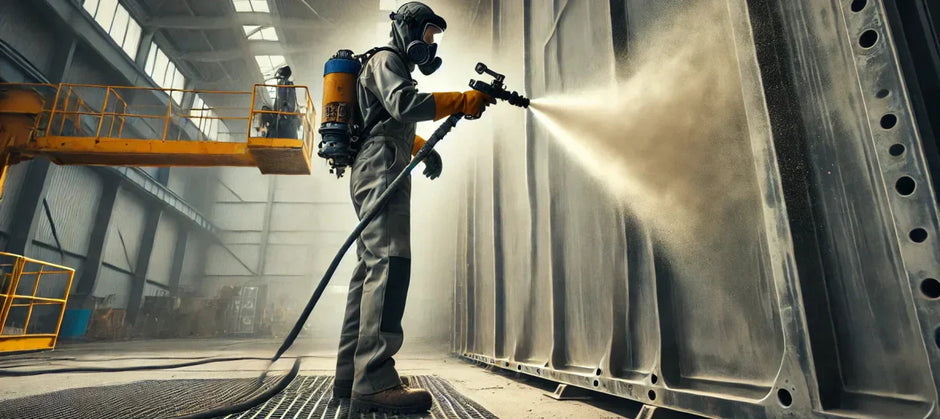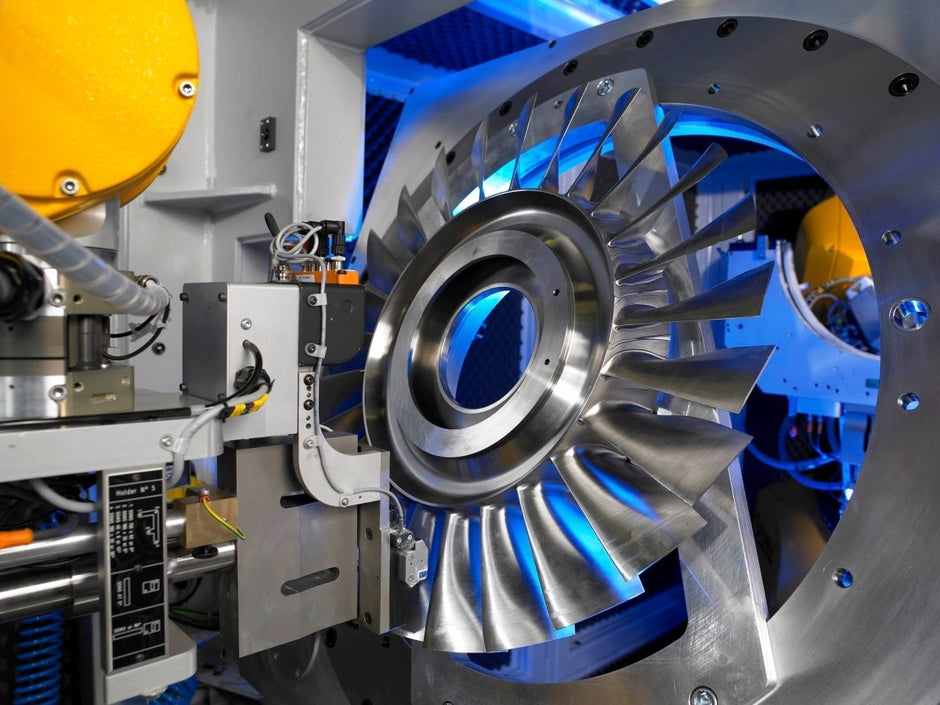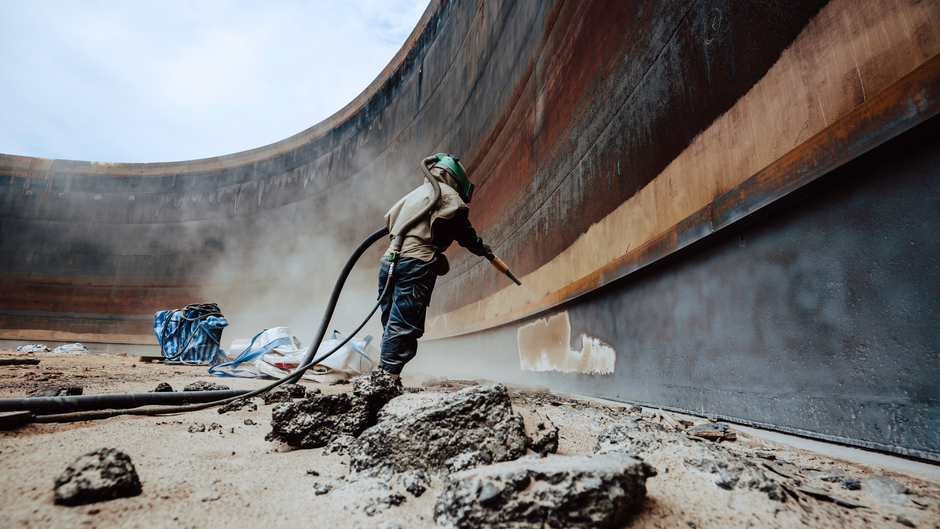DeFelsko and Elcometer
The selection of appropriate equipment for sandblasting and coating inspection is critical for ensuring operational efficiency, regulatory compliance, and long-term durability of protective coatings. This report provides a detailed comparison of solutions offered by two industry leaders—Elcometer (UK) and DeFelsko (US)—across key product categories, including coating thickness measurement, surface profile analysis, blast equipment, environmental monitoring, and compliance with industry standards. By evaluating technical specifications, versatility, and application-specific performance, this analysis aims to guide sandblasting companies in selecting optimal tools for their workflows.
Coating Thickness Measurement
DeFelsko PosiTector 200C Series
DeFelsko's PosiTector 200C offers broader substrate compatibility, including concrete, fiberglass, and plastics, with a measurement range of 50–3800 μm and superior accuracy (±2 μm + 3% of readings). The device features a 16-language interface, NIST/PTB-traceable calibration, and advanced data storage for 100,000 readings. Its Scan Mode enables rapid data collection (60+ readings/minute), making it ideal for large-scale inspections. Unlike Elcometer, DeFelsko's gauges integrate seamlessly with PosiSoft Software for comprehensive reporting.
Elcometer 500 Series
Elcometer's 500 series ultrasonic coating thickness gauges are designed for non-destructive testing on concrete substrates. The device employs multiple probes (C1 and C2) with measurement ranges of 0.15–2.50 mm and 0.75–9 mm, respectively, and an accuracy of ±2% or ±0.01 mm. It supports basic statistical functions (mean, standard deviation) and complies with ASTM D6132 and ISO 280. However, its application is limited to concrete, and it lacks advanced features such as automated temperature compensation or multi-language support beyond English, Chinese, and German.
Key Differentiation:
- Substrate Flexibility: DeFelsko supports non-metal substrates, whereas Elcometer is restricted to concrete.
- Accuracy and Compliance: DeFelsko's traceable calibration and tighter tolerances enhance regulatory adherence.
Surface Profile Measurement
Elcometer Concrete Inspection Tools
Elcometer's concrete inspection range focuses on rebar location, corrosion potential, and half-cell testing but lacks dedicated tools for post-blast surface profile measurement. While their equipment is robust for structural analysis, it does not directly address the peak-to-valley measurements required for abrasive-blasted steel surfaces.
DeFelsko PosiTector SPG1
DeFelsko's PosiTector SPG1 is a stylus-based roughness gauge engineered explicitly for sandblasted steel, measuring profiles from 0–500 μm with ±5 μm + 5% accuracy. It complies with ASTM D4417-B, SSPC-PA17, and U.S. Navy standards, ensuring adherence to blast profile specifications. The tungsten carbide stylus and alumina wear surfaces provide durability in harsh environments, while 50+ readings/minute enable rapid assessments.
Key Differentiation:
- Specialization: DeFelsko's SPG1 is purpose-built for blast profile measurement, whereas Elcometer's offerings focus on concrete diagnostics.
Environmental and Climatic Monitoring
DeFelsko PosiTector DPM L+
DeFelsko's DPM L+ dew point meter logs climatic conditions (humidity, temperature, dew point) for up to 600 days and auto-uploads data to PosiSoft.net for remote monitoring. This is critical for ensuring optimal coating application conditions post-blasting.
Elcometer's Limited Offerings
Elcometer provides coatings inspection tools but lacks dedicated environmental loggers, requiring third-party devices for climatic assessments.
Key Differentiation:
- Integrated Workflows: DeFelsko's environmental tools complement its inspection ecosystem, whereas Elcometer necessitates additional equipment.
Ease of Use and Versatility
Probe Interchangeability
DeFelsko's PosiTector Inspection Kits allow a single gage body to host probes for coating thickness, surface profile, humidity, and ultrasonic wall thickness. This modularity reduces costs and training time. Elcometer's 456 Coating Thickness Gauge also supports multiple probes but lacks integration with environmental or roughness modules.
Software and Reporting
DeFelsko's PosiSoft Software automates report generation with customizable templates, while Elcometer relies on third-party solutions.
Regulatory Compliance and Standards
Both brands meet ASTM and ISO standards, but DeFelsko's NIST/PTB-traceable calibration provides higher accountability for audits. Elcometer's calibration certificates are less rigorously documented.
Cost Considerations
- Elcometer: Lower upfront costs for basic gauges but limited scalability for advanced inspections.
- DeFelsko: Higher initial investment justified by long-term versatility, durability, and compliance benefits.
Conclusion
While both companies offer a range of products for the surface coating industry, they have different strengths and specializations. DeFelsko is known for its precision inspection tools and integrated software solutions, while Elcometer offers a broader range of products including blasting equipment.
This table compares their offerings across key product categories relevant to sandblasting and coating inspection:
| Category | DeFelsko Products | Elcometer Products | Key Differences | ||
|---|---|---|---|---|---|
| Coating Thickness Gauges |
|
|
DeFelsko supports non-metals; Elcometer focuses on metals/concrete | ||
| Surface Profile Gauges |
|
|
DeFelsko’s stylus complies with ASTM blast standards; Elcometer uses replica tape | ||
| Adhesion Testers |
|
|
DeFelsko uses cross-hatch for quick checks; Elcometer measures pull-off strength | ||
| Environmental Monitoring |
|
|
DeFelsko integrates with software; Elcometer lacks advanced logging | ||
| Blast Equipment |
|
|
DeFelsko focuses on inspection tools; Elcometer provides blasting hardware | ||
| Software |
|
|
DeFelsko’s software automates compliance reports; Elcometer offers basic functions | ||
| Calibration |
|
|
DeFelsko meets stricter audit requirements; Elcometer suits basic needs |
DeFelsko Pros and Cons:
-
Precision Inspection tool: DeFelsko specializes in advanced inspection instruments, such as the PosiTector SPG1 for surface profile measurement and the PosiTector DPM L+ for environmental monitoring. These tools are highly accurate and comply with global standards like ASTM and ISO.
-
Multi-Substrate Compatibility: Products like the PosiTector 200C can measure coatings on non-metal substrates (e.g., concrete, fiberglass, plastics), making them versatile for diverse applications.
-
Software Integration: The PosiSoft software suite provides advanced reporting, cloud synchronization, and trend analysis, enabling efficient data management.
-
Traceable Calibration Certificates: NIST/PTB-traceable calibration ensures regulatory compliance for audits and quality assurance.
-
Comprehensive Inspection Kits: The All-In-One Inspection Toolkit combines multiple tools for surface preparation and inspection, minimizing coating failures and saving time.
Cons
-
Higher Initial Costs: DeFelsko’s tools are premium-priced due to their advanced features and precision engineering. However, over-time price is retainable by using multiple probes.
Elcometer Pros and Cons:
Pros
-
Wide Product Range: Elcometer offers both blasting equipment (e.g., abrasive blast machines) and inspection tools, making it a one-stop solution for surface preparation and coating application.
-
Durable Blasting Systems: Products like the Elcometer 24200 Abrasive Blast Machine are robust, efficient, and designed for heavy industrial use.
-
Cost-Effective Inspection tool: The Elcometer 456 Coating Thickness Gauge provides reliable performance at a lower price point compared to DeFelsko alternatives.
Cons
-
Limited Software Features: The ElcoMaster software, while functional, lacks the advanced reporting capabilities of DeFelsko’s PosiSoft suite.
-
No Multi-Substrate Support: Elcometer’s inspection tools are primarily designed for metals and concrete; they do not support non-metal substrates like fiberglass or plastics.
-
Calibration Certificate: Elcometer’s certificates are general rather than NIST/PTB-traceable, which may not meet stringent audit requirements.
Recommendations on your buying needs
Choose DeFelsko if:
-
You require precise post-blast inspection tools that comply with ASTM/ISO standards (e.g., surface profile measurement with the PosiTector SPG1 or adhesion testing with the PosiTest CH Cross-Hatch).
-
Your projects involve coatings on non-metal substrates like plastics or concrete (e.g., using the PosiTector 200C).
-
You need integrated software solutions (PosiSoft) for data management, reporting, and cloud synchronization.
-
Regulatory compliance is critical (NIST/PTB-traceable calibration).
Choose Elcometer if:
-
You need a complete solution for both abrasive blasting (e.g., Elcometer 24200 Abrasive Blast Machine) and coating inspection tools.
-
You prefer cost-effective options without sacrificing reliability in basic inspections.
-
You want durable blasting equipment designed for industrial environments (e.g., bridges).
Final Thoughts
For sandblasting companies requiring end-to-end solutions—including blasting equipment—Elcometer is the better choice due to its comprehensive product range. However, companies focused exclusively on precision inspection or working with diverse substrates should opt for DeFelsko’s advanced tools and software ecosystem.
Ultimately, combining products from both brands may yield the best results by leveraging Elcometer’s blasting systems alongside DeFelsko’s superior inspection instruments for quality assurance.




